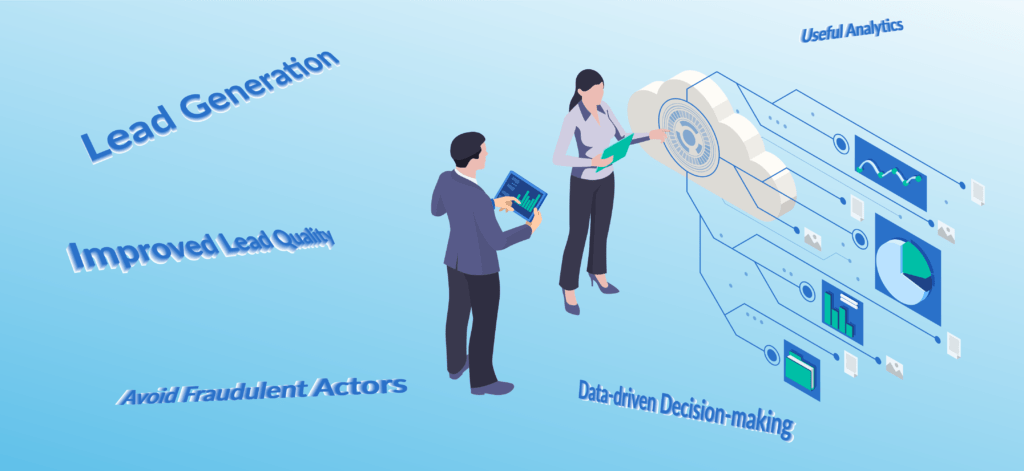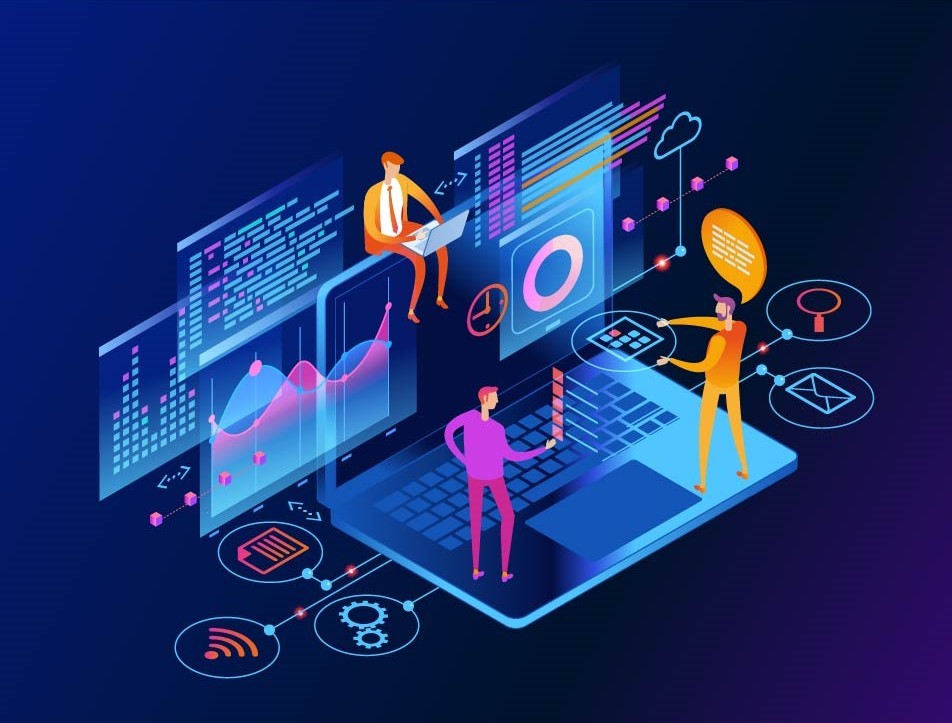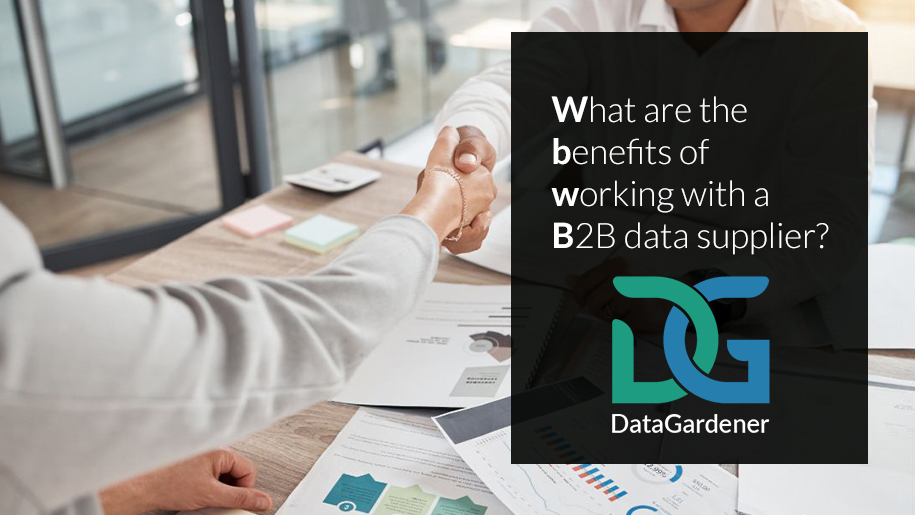Gathering and analysing data about your co-operators and competitors is one of the most under-utilised facets of business in the digital era. This is often due to businesses not having the time or resources to carry out such data-intensive work. However, what many fail to realise is that companies such as DataGardener, a B2B data supplier are designed to make the process of gathering and analysing business data as easy as possible.
With access to unparalleled amounts of data on rival UK businesses, your company can conduct proper due diligence on suppliers and creditors, identify your place in the market, your main competitors and much more. But what exactly is B2B data, which departments is it important to and what’s the benefit of using such a service?
What is B2B Data?
In general, B2B data is any relevant data gathered about another business. This could be quite literally anything about the business, but the three most important categories of B2B data, in our opinion, are as follows:
- Firmographic data – Firmographic data includes the company name, HQ location, size, employee numbers, revenue, etc. Any information that can be used to categorise an organisation counts as firmographic data quantitatively. This is the bread-and-butter of most B2B data suppliers and usually the most useful and relevant metrics to use.
- People or contact data – People and contact data is exactly what it says on the tin. This is data related to company directors, shareholders, their personal information and their personal links to other companies and business leaders. In our case, DataGardener allows you to view these as relationship trees – an easy and intuitive way to visualise who is related to who in your sector. This also relates to demographic data, such as the email addresses and telephone numbers of these business leaders.
- Chronographic data – Chronographic data relates to the time points of certain events such as when a director joined or left the company and other metrics such as company funding, acquisitions and hiring. This can be useful in identifying when certain people are leaving the company, the relocation of offices or when CCJs and charges have been filed against them.
B2B data providers such as DataGardener provide access to information on thousands of UK businesses. Each business has had hundreds of data points collected about them, allowing for unparalleled access into the workings of your own business, competitors’ businesses and those of your co-operators. This data can then be implemented by branches of your company to streamline processes and maximise profits.
The Benefits of B2B Data

Using B2B data can have many important benefits for your business, almost too many to name in a single article! B2B data also has many practical uses beyond merely monitoring the performance of other companies within your sector, and we have outlined some of these below:
- Lead generation – Utilising business data allows certain company branches – such as your sales team – to develop prospective leads. With a simple database search, your employees can determine whether a business would be suitable to receive your goods or services, meaning less time is wasted attempting to do business with companies who aren’t interested or don’t need your product. This turns cold calling into a much more profitable and useful venture, eliminating pure chance and allowing you to screen companies before attempting to call them. Ideally, this increases outbound sales.
- Useful Analytics – Alongside lead generation and improving outbound sales, analytics can monitor the financial situation of companies of interest. At DataGardener, we provide risk profiles on every company to give you an immediate insight into the current state of a business. Alongside this, we also provide detailed information on why we have classed a company this way and where they seem to be struggling. Analytics can also monitor metrics such as market growth, competitors, and any new niche openings. Analytics can even be used to monitor your company’s performance–showing you where you could improve internal processes and ensuring that your business is operating as efficiently and fully as possible.
- Data-driven decision-making – In the information era, utilising data to drive business decision-making is more important than ever. Business leaders often make decisions based on their experience and other qualitative aspects but fail to consider the quantitative data that can be used to improve their decision-making. Making decisions backed by data not only means those decisions are more likely to be the best but also provides a grounded rationale for their actions. With an excellent and accurate B2B database at their fingertips, making these decisions has never been easier for the risk-averse.
- Avoid fraudulent actors – Although this is a far less common use for B2B data, the insights generated from these databases can also help your business avoid potentially fraudulent businesses. Being able to see the financial, firmographic and chronographic data for these businesses allows your team to determine whether a business really is who they say they are before entering into dealings.
What Should you Look for in a B2B Data Supplier?
When choosing your B2B data supplier, there are a few key things to consider. First, customer service has to be excellent. At the end of the day, B2B data suppliers should supply you both with a product (the data) and a service. Poor customer service and a poor understanding of your target market mean your experience is unlikely to be too positive. Additionally, if you’re experiencing issues with the database itself, you want someone who can come back to you ASAP with a solution or instruction to help you use the database properly. It’s also really helpful to find a company that can give your team a tutorial on the most effective way to use the software and information to get the results they want.
One of the most important aspects of any B2B data supplier is the accuracy of its data. Inaccurate data is at best totally useless and, at worst, harmful to your decision-making. It’s also unspeakably annoying to be provided with an email address and telephone number which simply doesn’t work or is an old contact detail. Connected to this is the age of the data. If the data you’re being provided with is a year out of date, it simply won’t reflect the current state of whatever it is the data is purporting to show.
Finally, if you’re dealing with a service that doesn’t provide you with an online searchable database (unlike DataGardener) then you may need to check how long it takes the company to deliver the requested data to you. Waiting months for data to be delivered simply isn’t good enough, and there’s a decent chance that by the time you receive the data, it’s out of date. Long wait times also mean that data-driven decisions can’t be made quickly, and you may find yourself lagging behind other companies that can gain access to information much faster.
The Importance of B2B Data and Where it can be Utilised

We’ve already touched on some of the benefits of using B2B data and what to look for in a B2B data supplier, but how and where exactly could this data be used to improve operations in your own business?
- Sales teams – Sales teams are one branch of a business that has the potential to utilise B2B data the most. Generating leads using data sourced from a B2B data provider can hugely optimise outbound sales. Being able to search for companies and filter them out based on various financial or firmographic information can instantly provide sales teams with a list of potential clients to reach out to. This also impresses potential clients by showing them you understand their needs and current situation before contacting them.
- Marketing teams – Being able to view the state of a sector, competitors and suppliers allow your marketing team to streamline resources into highly profitable strategies based on the current climate. With the right data, marketing teams have the potential to enhance lead quality and make more data-driven decisions to find the most accurate prospects.
- Senior management – Although it’s unlikely that members of senior management themselves will be interacting with and searching through the B2B database, presenting relevant data on an infographic for these roles can help encourage data-driven decision-making from the highest up in the company. This, in turn, should work to increase profits, confidence and overall happiness within the company from both employees and shareholders. Data-driven decision-making provides a win-win scenario for all parties involved.
How DataGardener Can Help
Here at DataGardener, we provide accurate and award-winning service for companies seeking B2B data on UK businesses. DataGardener is the ecosystem that enables businesses to access 24 interconnected public and private corporate datasets to improve their business performance through advanced prospecting and effective financial risk management and analysis. Our business intelligence data can be seamlessly integrated into another system via modern API by the client or us. This corporate data can streamline onboarding procedures, underwriting, prospecting and marketing. All you need to start is a goal, and DataGardener, a B2B data supplier, can help you achieve it.
